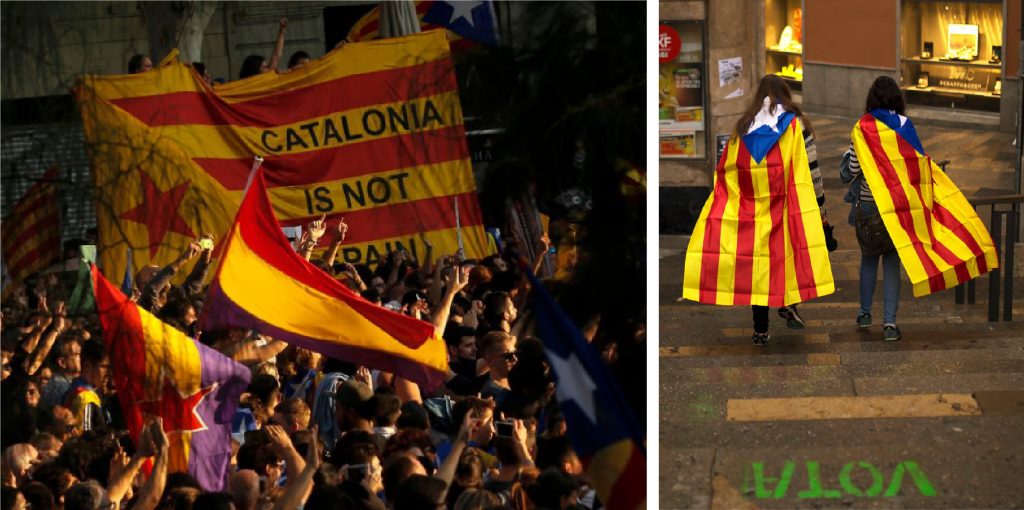In scenes straight from a 1984-esque dystopian thriller, armed policemen from the Spanish Guardia Civil descended into the streets of the Catalonian region over the weekend to halt a planned referendum for independence. Clubs were whirled in the air, polling stations demolished, and voters shoved to the ground.
At last count, more than 1,300 people were injured in the crackdown on the Catalonian independence referendum, including 893 civilians armed with nothing but aspirations for a new country.
Overall, 90 percent of the region voted to make Catalonia an independent state. Spanish political elites say it was an illegal and unconstitutional referendum. They’re likely not wrong. Constitutions don’t encourage secession.
Where Catalonia goes from here is the larger question. For years, Spain toiled from an economic crisis. Youth unemployment is still high but gains are moderate.
The ultimate precedent set by the outcome of the Spanish constitutional crisis could mean a new dawn for independence movements worldwide.
Wartime dystopian auteur George Orwell was very familiar with Catalonia. He chronicled his time as a fighter for the socialists against the fascists during the Spanish Civil War in “Homage to Catalonia,” a celebrated and raw look into warfare and guerrilla violence.
Trekking through the Catalonian countryside with a rifle by his side, Orwell reserves his analysis for questions of country, power, and propaganda.
“I have tried to write objectively about the Barcelona fighting, though, obviously, no one can be completely objective on a question of this kind,” he wrote.
Orwell knew that breaking up a country is a big deal. It threatens assumptions about our borders, our laws, and our relationships with our neighbors.
Lessons learned
The last country that successfully seceded after a referendum was the nation of South Sudan in 2011. But it’s currently mired in civil war and conflicts over resource rights.
The Kurdistan Regional Government held a successful independence vote on Sept. 25 to break away from Iraq. Turkey and Iran, with their own Kurdish populations, have united to oppose the result. They’ve called it a “foreign sectarian plot.” It’s not clear what will happen next.
When I traveled across Scotland during the 2014 referendum and spoke with dozens of campaigners and ordinary voters, the reasons for separation were simple: more autonomy, more local law, and less interference from a far-away governing capital. The parallels for Brexit, the U.K.’s exit from the European Union accepted by referendum, are quite obvious. But Scotland lost with only a 45 percent vote in favor of independence.
Dick Morris: IN CATALONIA AND SCOTLAND: THE SAME POLITICAL PARADOX
In Catalonia, independence extends beyond technical questions of sovereignty. Culture, language, and history play more of a factor in wanting to be independent than just questions of where parliamentarians sit when they govern.
For centuries, a great Catalonian principality spanned across the Mediterranean, including parts of modern-day France and Italy. Its language and writing were vibrant and celebrated. It remained independent until the Nueva Planta decrees in the early 1700s, folding Catalonia into the Castilian state. Successive royal marriages and interventions from the Spanish crown sealed the region’s fate.
The 20th-century Spanish dictatorship of Francisco Franco, lasting three decades until 1975, quashed civil liberties and all but extinguished Catalonian identity and language. It only made a resurgence after his death. That history is an important factor in motivating young Catalans today. It’s a feeling I know well.
I was born in Quebec, the French-speaking region that has twice voted on its own independence from Canada, the last vote losing by just 0.1 percent in 1995.
Much like Catalonia, whole political parties hold independence as their prime objective. Protection of a minority language – French for the Quebecois and Catalan for the Catalonians – as well as a history of subjugation, are key motivators for secession. Economic sovereignty and political independence another. Disputes of sovereignty between institutions are frequent.
Hurdles And High Hopes On The Way To Kurdistan’s Historic Referendum
The Quebec referenda, though, weren’t good for business. Large financial firms moved their headquarters from Montreal to Toronto, many English-speaking people fled the province to neighboring Ontario, and the economy soured under the weight of uncertainty.
After 1995, Canada’s federal politicians recognized this. Provincial governments were encouraged to make more decisions on their own, they were respected as equal partners in negotiations and their autonomy was respected. As such, Canada remains one of the most decentralized federations in the world.
Today, Quebec has a booming economy. Unemployment is falling faster than any other province and investment is up. Last year’s budget surplus was more than $2.5 billion, a feat not seen in 20 years. Owing to these circumstances, the appetite for separatism is fading. The top two political parties shun separatism and even the most ardent Quebec nationalist leaders don’t promise a referendum in a first mandate.
That raises a question: Without a financial crisis, would Catalonian independence have been as successful as it was?
Where we go now
Territorial secession doesn’t have a good history in the United States, and for a good reason.
Even with the heavy-handed response from the Spanish state, the desire for Catalonian independence has not yielded the bloodshed or violence of the U.S. Civil War.
If Spain wishes to channel the ambitions of the Catalonian people away from independence, it’ll have to cede more autonomy for them to govern their own affairs. It may have to consider a new constitutional convention or power-sharing agreement with the regional government.
But unlike Quebec, a majority of Catalonians did vote to declare independence. Whether it proved legal or not, Spain will have to address that with rigor.
A divorce would be messy and ultimately costly, but it’s one the Catalonian people ultimately desire. If we believe in democracy, then we should support the choice of the people in Catalonia in their pursuit to be independent, even if it shakes the foundation for our conception of nationhood.
Originally posted at the The Washington Examiner.





